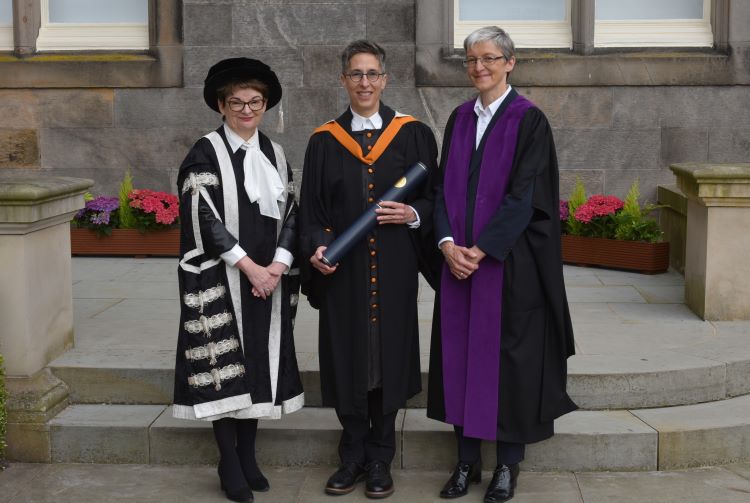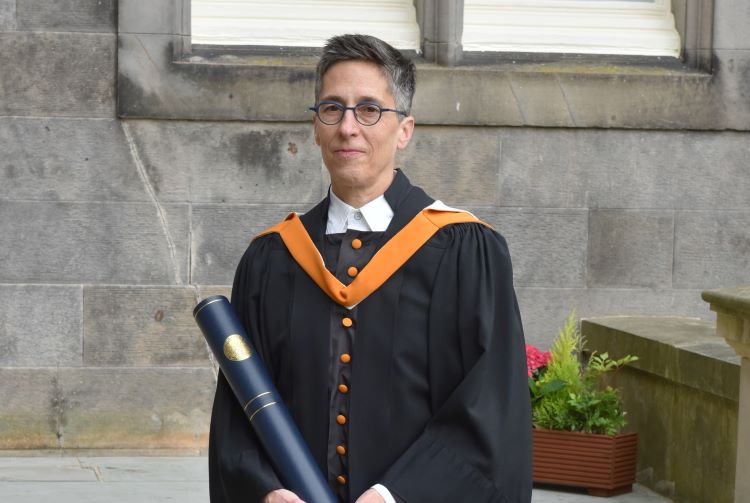Alison’s drawing the difference

Internationally acclaimed graphic novelist Alison Bechdel was awarded an honorary degree by the University of St Andrews this week in recognition of her major contribution to the comic art form, and for advancing diversity and representation.
Addressing new graduates in Younger Hall on Thursday 13 June, she said, “If you had told me 40 years ago that the comic strip I was drawing in my spare time about a bunch of lesbians would not only turn into a viable career, but would lead one day to an honorary degree from a university several years older than my country, I would have thought you were mad.”
Alison’s seminal comic book series, Dykes to Watch Out For, began when she “didn’t see people like me, or my friends, reflected in culture… so I decided I would just create that depiction for myself”. Described as “a countercultural institution among lesbians and discerning non-lesbians all over the planet” and “one of the pre-eminent oeuvres in the comics genre”, Dykes to Watch Out For became one of the earliest and longest-running representations of lesbians in popular culture. Published weekly for 25 years, it recounted the lives and relationships of Mo, Harriet and their friends, and provided vital reflection for generations of the queer community.
Dykes to Watch Out For also spawned the now infamous and eponymous, ‘Bechdel test’ following one character’s decision that she will not watch a movie unless it features two women, talking to each other, about something other than a man. Now a recognised standard for assessing gender bias in film, the Bechdel Test has been the focus of numerous research papers, as well as being used in the film industry to support greater gender equality.
Over the course of her career, Alison’s work has appeared in The New Yorker, the New York Times Book Review, Granta, and over fifty alternative and LGBTQ+ publications – securing success in an area dominated by men, and through a medium which has often excluded the queer community. It has been recognised through a wide range of awards including a prestigious Guggenheim Fellowship and MacArthur Foundation ‘genius’ grant.

Delivering the laureation, Dr Rebekah Widdowfield, Vice Principal (People and Diversity) said: “While Alison eschews the term ‘ground-breaking’ it’s important to recognise how pioneering it was. But what also stood out, was that Alison decided to tell her stories in the form of a comic strip, a form she has taken to new levels as the author of three book-length graphic memoirs: Fun Home (2006), Are You My Mother? (2012) and, most recently, the Secret to Superhuman Strength (2021).
“While the focus of her first two graphic memoirs drew on her often complicated relationships with her father and mother respectively, what is clear is that she gained much from both. As Alison herself puts it, ‘My father taught me to be an artist. My mother taught me to be a writer’. It is these skills that she combines to such brilliant effect in her work.”
Common to all three books is the way in which they draw on a wide range of writers and thinkers – from Woolf to Wordsworth, Camus to Kerouac – displaying an intellectual depth and dexterity that has pushed the boundaries of graphic storytelling and taken it in new directions. Indeed, Fun Home is often credited as a turning point for the graphic medium, with its success contributing to the popularity of the genre, and to graphic novels being appreciated as a serious art form by the media.
In accepting her honorary degree, Alison thanked new graduates “for the progress you will achieve.”
“It’s a challenging moment at which to be joining the fray, and I haven’t even mentioned the climate or the pandemic, but I feel sure that you are all up to this task, that you will use your scholarly skills to tease apart and expose the attacks on truth and reason, the manipulations of language and the cynical and desperate attempts to rend the already delicate enough social fabric.”
“Creating positive change in the world is hard work. It will go a lot better if you really enjoy that work, so I hope that you can all find something to do that you really love doing. It also will go a lot better if you are doing it for some larger purpose.”
“As a young person what really got me out of bed in the morning and drove me to keep at my work until I got better was not just love of the work itself but love for the people with whom I was in this struggle. That sense of collective purpose is its own generous reward, of course, but if your goal is to create a better, more humane world for everyone, solidarity will also make you exponentially more effective”.
Category Graduation